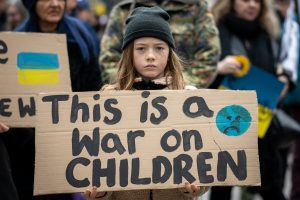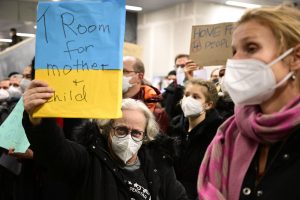Ukraine Daily Updates from First News
 Ukraine update, Monday 7 March
Ukraine update, Monday 7 March
In just ten days since the fighting began, more than 1.5m people have now fled Ukraine. The United Nations has said that it is “now the fastest growing refugee crisis since World War 2”. The situation is putting huge pressure on Poland, which has seen more than 885,000 cross its border from Ukraine.
Russia has been heavily criticised for not allowing people to escape safely. Attempts to get large numbers of civilians out of Mariupol were cancelled twice due to Vladimir Putin’s Russian forces continuing to bombard the city. The people of Mariupol have had no running water or electricity for the last five days, so people are desperate to leave. Food and bottled water are running out.
Vladimir Putin’s forces have said they will open some routes for Ukrainian refugees, but only into Russia or Belarus. Russian troops have been launching some attacks on Ukraine from Belarus, so it seems unlikely that many people from Ukraine would want to flee into Belarus or Russia.
The World Health Organization (WHO) says it has confirmed that several attacks have targeted healthcare facilities in Ukraine. Deliberately targeting medical buildings and workers is illegal under international law. There are always accidents and mistakes during wartime, but the huge number of civilian targets that have been hit by rockets and mortar fire is a sign that Vladimir Putin is deliberately targeting ordinary people.
Putin keeps a tight grip on Russia’s media and the internet, and reports from the country have shown that people aren’t getting the truth about the invasion. But there are ways that people can still access independent news, and this is fuelling protests. More than 4,300 people in 44 Russian cities were said to have been arrested yesterday (Sunday) for protesting against the war.
And, in positive news, the Disasters Emergency Committee appeal has now topped £100m in the UK alone, as the world pulls together to support Ukraine.
 Ukraine update, Fri 4 March
Ukraine update, Fri 4 March
As the war in Ukraine continues, nearly 1.2 million people have now fled Ukraine into neighbouring countries. More than half a million of those are in Poland. The United Nations (UN) estimates that four million people might leave Ukraine in the coming weeks.
One of the most heartwarming moments of this crisis came when trainloads of refugees ended up in Berlin, Germany. Hundreds of locals stood at the train station with signs saying that they would let refugees stay in their homes.
Although Ukraine isn’t part of the European Union (EU), Ukrainian refugees have been given the right to live and work in the EU for the next three years. It’s the first time the EU has ever used what’s known as the Temporary Protection Directive, and it also gives refugees from Ukraine the right to get medical treatment. It’s usually quite hard for refugees to live a normal life when they make their way to a new country, but this should make things much easier for them.
Kherson, in the south of Ukraine, has become the first city to fall under the control of the Russian army. It’s a small but important port and is close to Crimea, the southern region of Ukraine that has been occupied by Russian forces since 2014. The mayor of Kherson said that Russian troops have put a curfew on the city, and people are terrified to leave their homes.
Although deliberately targeting civilians in a war is illegal under international law, hundreds of Ukrainian civilians have been killed in the last week. Schools, hospitals and buildings such as theatres and gyms have been badly damaged or destroyed, as well as a TV broadcasting tower. The International Criminal Court has already said that it has started an investigation into “war crimes and crimes against humanity” that have taken place as a result of President Vladimir Putin’s decision to invade Ukraine.

 Ukraine update, Monday 7 March
Ukraine update, Monday 7 March Ukraine update, Fri 4 March
Ukraine update, Fri 4 March